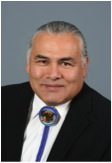
Panelists representing tribal, state and federal perspectives discussed facts and data behind the biological impacts of treaty rights implementation. Discussions stressed that resources have not been negatively impacted by treaty harvests and that subsequent management has improved with the addition of tribal input and cooperative efforts. These points were made through examples of shared inland and Lake Superior fisheries as well as with wildlife.
(Note: Each speaker section includes: photo, biography, speech excerpt, downloadable pdf of full speech, and each Youtube video link.)
Moderator:
|
Tom Busiahn coordinates the National Fish Habitat Action Plan for the US Fish & Wildlife Service based in Arlington, Virginia (since 2000) managing fisheries and habitat conservation programs. Previously, Tom supervised the USFW Fishery Resources Office in Ashland, Wisconsin. From 1984 to 1991, Tom directed the Biological Services Division of the Great Lakes Indian Fish & Wildlife Commission. Before this he served as the first tribal biologist for the Red Cliff Band of Lake Superior Chippewa.
|
|
Panelists:
|
Henry M. Buffalo Jr. is the managing shareholder with the firm Jacobson, Buffalo, Magnuson, Anderson & Hogen. He joined the St. Paul law firm in 1991. He's a member of the Red Cliff Band of Lake Superior Chippewa. And before entering private practice, he served as in-house tribal counsel for the Red Cliff Tribe and later for the Fond du Lac Band which he continues to represent in a lawsuit affirming Fond du Lac's 1837 and 1854 ceded territory rights. Henry served as the first executive administrator of GLIFWC. He received his JD from the University of Wisconsin Law School in 1981 and has a Bachelor's in Criminal Justice from UW Milwaukee in 1978.
|
|
|
||
|
George Meyer began his 32-year career with the Wisconsin Department of Natural Resources after graduating from St. Norbert College and UW-Madison Law School. George represented the agency as an attorney for 10 years and then was promoted to Division Administrator for the Division of Enforcement. While in this position, he had responsibility for all of the DNR’s Enforcement programs including the state’s conservation wardens. George served as the lead negotiator for the state during the Chippewa Treaty Right controversy. George served as DNR Secretary from 1993 until 2001.
|
|
|
||
|
Randy Charles is an Assistant Forest Supervisor on the Ottawa National Forest (10 years), with 25 years with US Forest Service. He has served as tribal coordinator for Ottawa National Forest for 17 years and was one of the USFS representatives involved in the development of the current Memorandum of Understanding (MOU). Randy has served as a federal mediator and an independent tribal mediator with 20 years of national mediation experience.
|
|
|
James E. Zorn is the Executive Administrator for GLIFWC. Prior to assuming his leadership role as GLIFWC Executive Administrator, Jim served as the agency’s lead attorney/policy analyst from 1987 to 2006. He has been extensively involved in the affirmation and implementation of Ojibwe ceded territory treaty rights, particularly regarding the Lac Courte Oreilles v. State of Wisconsin, or the Voigt case, and the Mille Lacs Band v. Minnesota case. Prior to joining GLIFWC's staff, he served as tribal attorney for the Lac Courte Oreilles Band and represented the tribe in the Voigt treaty case. He is a graduate of the University of Notre Dame (1978) and University of Wisconsin Law School (1981).
|
|
|
||








